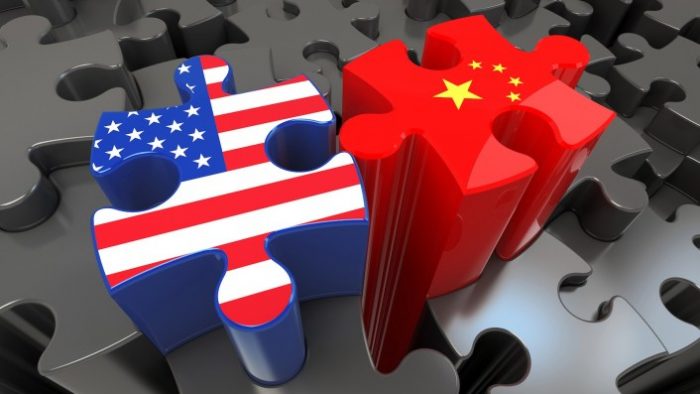Chinese officials said on Friday they are evaluating US requests to start trade negotiations to settle a trade war that has roiled financial markets in recent weeks.
The Commerce Ministry in Beijing said in a statement that senior US officials had reached out “through relevant parties many times” in a bid to start talks with China on tariffs.
But Chinese authorities repeated their earlier request that the US must cancel all unilateral tariffs before they start any negotiations, saying that failure to do this would show “the US is completely insincere” and that would undermine mutual trust.
ALSO SEE: US Has Reached Out to Discuss Tariffs, China’s State Media Says
“If the US side wants to talk, it should show its sincerity and be prepared to correct its wrong practices and cancel unilateral tariffs,” it said, according to a translation of the statement.
“China’s position is consistent. If we fight, we will fight to the end; if we talk, the door is open,” but it said, “The tariff war and trade war were unilaterally initiated by the US side.
“What China wants to emphasize is that in any possible dialogue or talks, if the US side does not correct its wrong unilateral tariff measures, it means that the US side is completely insincere and will further damage the mutual trust between the two sides.
“Saying one thing and doing another, or even trying to coerce and blackmail under the guise of talks, will not work in China.”
The remarks follow US President Donald Trump announcing tariffs of 145% on Chinese imports – incremental moves that led by Beijing responding with retaliatory levies totalling 125%.
Most markets in the Asia-Pacific rose on Friday after the news emerged. Hong Kong’s Hang Seng Index was up 1.74%, along with the Nikkei and the ASX in Sydney, which were climbed by just over 1%, while the BSE Sensex in Mumbai edged up 0.3%. But markets on mainland China were closed for a holiday.
Confusion and uncertainty
There has been uncertainty on how the tariff crisis would play out because of the confusing and hectic way they were unveiled by President Trump over the past couple of months, which was made worse by conflicting statements from the White House on whether talks were underway with the Chinese leadership.
On Tuesday Beijing released a propaganda video warning that it “won’t kneel down” to Trump, in a signal that the chaotic way the trade war has been unveiled has upset and offended the Chinese, given the shockwaves that have reverberated through its manufacturing and shipping sectors.
But both sides have also sought to defuse the tension by allowing exemptions on various products, while President Trump signed an executive order on Wednesday that exempted imported cars and parts from hefty tariffs.
US Secretary of State Marco Rubio told Fox News on Thursday that the “Chinese want to meet and talk,” according to Reuters, and suggested that such talks were likely to occur soon.
Treasury Secretary Scott Bessent also played up hopes of a “big deal” in a Fox Business interview, saying US-China tariffs are at the current levels are “not sustainable on the Chinese side”.
‘An unpredictable wildcard’
Others believe the two sides may have shown little appetite for compromise and that the best that could be hoped for would be tariffs being lowered to far lower two-digit levels.
Given this, analysts say it could take a long time for the two sides to reach a comprehensive settlement. And that could only happen if details of any trade deal are agreed on privately – if they make it to the negotiating table.
Trump has said many times he wants to “significantly” reduce the scale of the tariffs and do a deal with his counterpart Xi Jinping.
But one of the biggest barriers to a deal could simply be the US President’s unpredictable, chaotic and impulsive manner.
That has been clearly visible this week. On Wednesday Trump was reported to have told a Cabinet meeting: “We’ve been ripped off by every country in the world, but China I would say is the leading … candidate for the ’chief-ripper-offer’.”
And on Thursday, Trump warned that any country purchasing oil from Iran will be hit with secondary sanctions and barred from doing business with the US.
In a post on Truth Social, the president said: “Any Country or person who buys ANY AMOUNT of OIL or PETROCHEMICALS from Iran will be subject to, immediately, Secondary Sanctions. They will not be allowed to do business with the United States of America in any way, shape, or form.”
No mention was made of other countries, but Politico noted that China’s “imports of Iranian crude oil reached a record 1.8 million barrels per day in March, according to Vortexa, an energy and freight market analytics company.”
Trump appeared to be putting a squeeze on both Beijing and Tehran while attempting to do deals with both countries, it said.
Amid such bravado, one can only wonder where things will end.
- Jim Pollard
ALSO SEE:
As Trump Tariffs Hurt The Dollar, China Dreams of a Global Yuan
China Unveils Propaganda Video, Vows to ‘Never Kneel’ to Bullies
China ‘Compiling a List of US Goods Exempt From Its 125% Tariffs’
US Says One of its First Trade Deals Will be With India
China Warns CK Hutchison, BlackRock: Be Careful on Ports Deal
China Says US Tariffs Severely Affect Its Airlines and Boeing
Tariffs Must be Scrapped if US Truly Wants a Trade Fix: China
Chinese Exporters Slow to Switch to ‘Weak’ Domestic Market
India Eyes $23bn in Tariff Cuts on US Imports to ‘Save Exports’
























